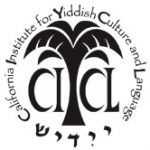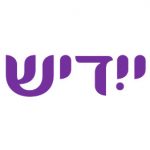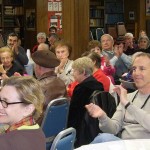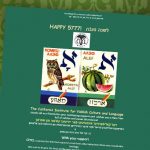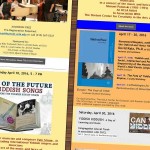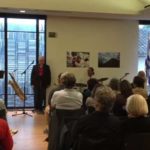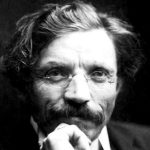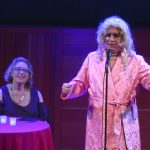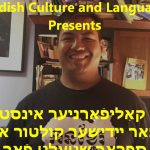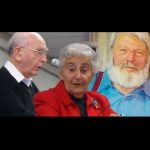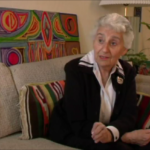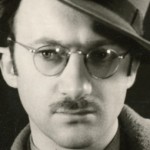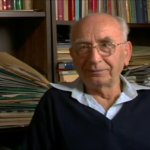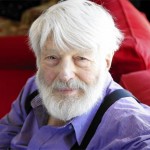A Yiddish Poet Dies: Thoughts On the Loss of Avrom Sutzkever
by Miri Koral
If a giant sequoia falls in the forest and no one recognizes it, does it make a noise?
The pinnacle of 1,000 years of Jewish European civilization, Yiddish culture, has been hacked at, had its roots burned and severed, its new shoots diverted to Zionist nationalism, its surviving hollowed-out trunk deliberately ignored or entirely forgotten. And yet, and yet, that trunk kept producing limbs and branches and blossoms — fragile, miraculous creations in some cases as magnificent as any issuing forth from humanity in the last tortured century.
So it is with sadness and shame that we must admit that the Nazis and Stalinists, the zealous Israeli nationalists, the fervent and apathetic assimilationists have their tragic victory: the great husk of a tree has fallen and virtually no one has noticed nor recognized it. The crowning glory of Yiddish civilization is no more. And this in the space of one generation.
If the death of, let’s say, Robert Frost or Rainer Maria Rilke had made barely a ripple, would that not mark the demise of the English and German-speaking civilizations? “Civilization” here means not the ability to speak, read, and google in a language, but the continued support for and creation in that language of works that contribute to the elevation and evolution of the human spirit. If the death this week of the supreme modern Yiddish poet, perhaps the greatest of all Jewish poets, is hardly felt in the greater Jewish world – does that not signify?
Even though Avrom Sutzkever, the giant of a poet who died in Tel-Aviv, Israel on Wednesday morning, January 20, 2010 is widely recognized and revered by Yiddish culturalists; even though he was the only Yiddish poet to have been awarded the Israel Prize (1985); even though he was the only Yiddish poet published in the New Yorker – so very few today are aware, let alone comprehend the magnitude of the loss. With a characteristic pithiness, it is said about Yiddish poets that they are the only true poets because they know they write only for themselves, not expecting that there is enough of a Yiddish-literate audience to read them.
I teach Yiddish seriously to some dozens of people every week – ranging in age from 18 to 80. Most of them are earnest in their desire to grasp something of the tongue that flitted around their ears when they were young, the words of their grandparents or the words their parents chose to secret away. Or sometimes they’re drawn out of curiosity for this unique folk language. But few of these by now many hundreds that I’ve taught will ever have the motivation to achieve the skill to read Avrom Sutzkever in the original life-giving mameloshn, the Yiddish mother tongue of at least 10 million people only a generation before mine (I could be mother to the 18-year-olds).
Already renowned (at least in the Yiddish-speaking world) prior to WW II, Avrom Sutzkever, a hero for other reasons as well, persisted in his writing under inhumane, even coffin-like conditions in the Vilna Ghetto. As he writes about himself, the narrator, in one of his autobiographical stories about the Ghetto, “It was as if the Angel of Song had confided to me, “In your own hands lies the choice: if your song inspires me, I’ll protect you with a flaming sword; if not – no complaints… My conscience will be clear.”” He made the choice and fulfilled this condition in spades throughout those horrific years, and later under the hopeful blue skies of his new homeland. Thus, one might say, the Angel of Song spared Sutzkever until the age of 96, to the great benefit of his people and the world.
And who but a tiny handful know to reap this benefit? For any perception of Yiddish has been so deeply buried as to be forgotten or so distorted as to be devalued to a joke (“Shlep your shmates over here, you shlemiel” – ha-ha, such a funny language!) That there existed until this week a poet of the ilk of Avrom Sutzkever, who was called both the “Ariel of Yiddish poetry” – one who bestowed his richness of words with a musicality, intellectual and spiritual depth, and playfulness rare in any language – as well as the unstinting “poetic witness to his people’s greatest tragedy”, is an actuality to be embraced with reverence and pride.
So it is with a heavy heart that I can but reconcile myself to the fact that my labors and those of others like me in pockets throughout the world, do little more than raise awareness, and only among students and others who know enough to ask. If nothing else, let a great misperception be rectified, for, as in the words of Cynthia Ozick and the late great Yiddish journalist and writer Mordechai Tsanin: “Yiddish didn’t die (of neglect) — it was murdered”. Let us also hope that healing attention can be drawn to a widespread cultural amnesia that has blinded us to the flowers of a felled civilization, with seeds that can still nourish us all.
Miri Koral is a lecturer in Yiddish at UCLA and the University of Judaism, the founder and CEO of the California Institute for Yiddish Culture & Language, and a Yiddish poet and translator.




